高中英语倒装句讲解
高中英语语法倒装句总结讲解
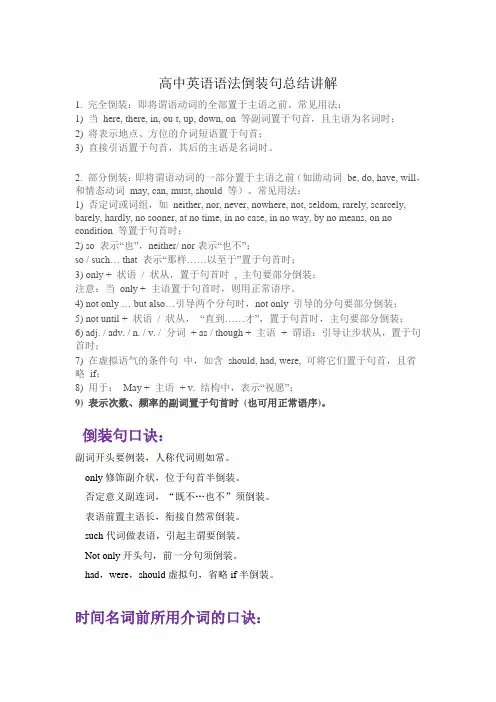
高中英语语法倒装句总结讲解1. 完全倒装:即将谓语动词的全部置于主语之前。
常见用法:1) 当here, there, in, ou t, up, down, on 等副词置于句首,且主语为名词时;2) 将表示地点、方位的介词短语置于句首;3) 直接引语置于句首,其后的主语是名词时。
2. 部分倒装:即将谓语动词的一部分置于主语之前(如助动词be, do, have, will,和情态动词may, can, must, should 等)。
常见用法:1) 否定词或词组,如neither, nor, never, nowhere, not, seldom, rarely, scarcely, barely, hardly, no sooner, at no time, in no case, in no way, by no means, on no condition 等置于句首时;2) so 表示“也”,neither/ nor表示“也不”;so / such… that 表示“那样……以至于”置于句首时;3) only + 状语/ 状从,置于句首时, 主句要部分倒装;注意:当only + 主语置于句首时,则用正常语序。
4) not only … but also…引导两个分句时,not only 引导的分句要部分倒装;5) not until + 状语/ 状从,“直到……才”,置于句首时,主句要部分倒装;6) adj. / adv. / n. / v. / 分词+ as / though + 主语+ 谓语:引导让步状从,置于句首时;7) 在虚拟语气的条件句中,如含should, had, were, 可将它们置于句首,且省略if;8) 用于:May + 主语+ v. 结构中,表示“祝愿”;9) 表示次数、频率的副词置于句首时(也可用正常语序)。
倒装句口诀:副词开头要例装,人称代词则如常。
only修饰副介状,位于句首半倒装。
高中英语倒装句讲解
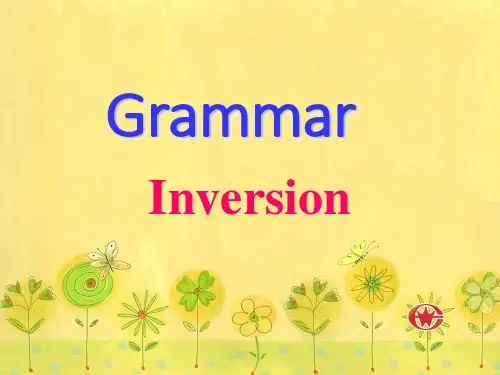
• Try as he would, he might fail again.
2.用于“No sooner … than …” / “Hardly … when …”; “Not until … 主句” 的句型中。 No sooner had she gone out than the
只有当Not only… but also连接两 个分句时,才在第一个分句用倒 装结构。如果置于句首的Not only… but also仅连接两个并列词 语,不可用倒装结构。
Not only you but also I am fond of music.
Not only can mp3s provide us with fun, but also they can help us learn English well.
4. A terrible Genie(妖怪) stood before the fisherman. Before the fisherman s_t_o_o_d__a _t_e_rr_i_b_l_e _G__en__ie_.
5. In those days people seldom did experiment to test their ideas. S_e_l_d_o_m__d_i_d_p_e_o_p_l_e_d_o__e_x_p_e_r_im__e_n_t to test their ideas.
2. Not until all the fish died in the river ____ how serious the pollution was. A. did the villagers realize B. the villagers realized C. the villagers did realized D. didn’t the villagers realized
高中英语2025届高考语法复习倒装句知识讲解
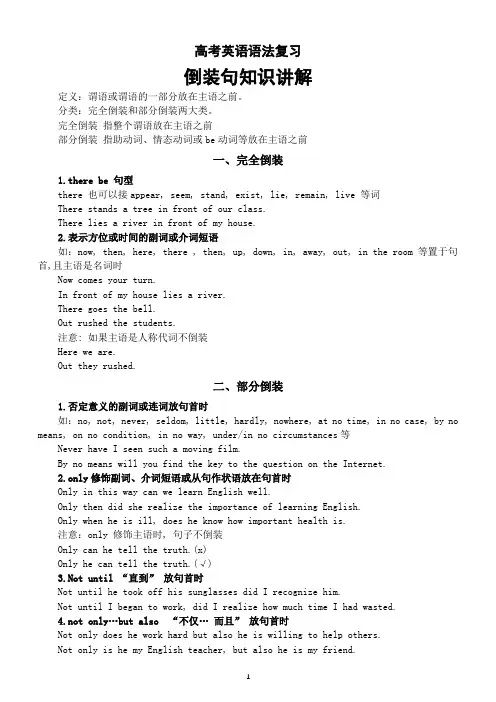
高考英语语法复习倒装句知识讲解定义:谓语或谓语的一部分放在主语之前。
分类:完全倒装和部分倒装两大类。
完全倒装指整个谓语放在主语之前部分倒装指助动词、情态动词或be动词等放在主语之前一、完全倒装1.there be 句型there 也可以接appear, seem, stand, exist, lie, remain, live 等词There stands a tree in front of our class.There lies a river in front of my house.2.表示方位或时间的副词或介词短语如:now, then, here, there , then, up, down, in, away, out, in the room 等置于句首,且主语是名词时Now comes your turn.In front of my house lies a river.There goes the bell.Out rushed the students.注意: 如果主语是人称代词不倒装Here we are.Out they rushed.二、部分倒装1.否定意义的副词或连词放句首时如:no, not, never, seldom, little, hardly, nowhere, at no time, in no case, by no means, on no condition, in no way, under/in no circumstances等Never have I seen such a moving film.By no means will you find the key to the question on the Internet.2.only修饰副词、介词短语或从句作状语放在句首时Only in this way can we learn English well.Only then did she realize the importance of learning English.Only when he is ill, does he know how important health is.注意:only 修饰主语时, 句子不倒装Only can he tell the truth.(x)Only he can tell the truth.(√)3.Not until “直到”放句首时Not until he took off his sunglasses did I recognize him.Not until I began to work, did I realize how much time I had wasted.4.not only…but also “不仅…而且”放句首时Not only does he work hard but also he is willing to help others.Not only is he my English teacher, but also he is my friend.5.neither..., nor...“…不…, …也不…”Neither do I know it, nor do I care about it.6.no sooner...than, hardly/scarcely...when “一...就”Hardly had he arrived when the train left.No sooner had she gone than the traffic accident happened.7.“so+adj./adv.+ that...和“such+(a/an+) adj.+n.+ that...句型中, “so或such”放句首时So excited was he that he could not say a word.Such a good job has he done that we all admire him.8.“so + be 动词/ 助动词/ 情态动词 + 主语”用于对前面所说的肯定内容也适用于后者,表示“也”He is kind and helpful, so is she.I like English, so does he.They can speak English well, so can she.区分:He is kind and helpful, so he is.(不倒装表示“确实”)I like English, so I do.They can speak English well, so they can.9."neither/nor + be 动词/ 助动词/ 情态动词 + 主语”用于对前面所说的否定内容也适用于后者,表示“也不”He isn’t kind and helpful, neither/nor is she.I don’t like English, neither/nor does he.I can’t speak English well, neither/nor can she.注意:如果前面所说的内容既有肯定又有否定,或前后的谓语动词形式不一致时,则用结构“It is the same with +主语”或“So it is with +主语”I worked hard, but didn't pass the exam.So it was with my friend Lucy.10.as/though引导的让步状语从句结构 n./ adj./ v./ adv.+ as / though + 主语 + 谓语Child as he is, he knows a lot.(child 前不加冠词)Young as he is, he knows a lot.Try as he might, he failed.Much as I like Beijing, I can’t live there.11.频率的副词(often, many a time 等)放句首时Many a time has he made the same mistake.Often does he make the same mistake.12.虚拟语气if 引导的条件状语从句Were I you, I would work harder.Had you followed my advice, you would have passed the exam.Should it rain tomorrow, I would stay at home.13.某些表示祝愿的句子May you be happy!May your future become prosperous.。
高中英语倒装句讲解以及习题(附答案)
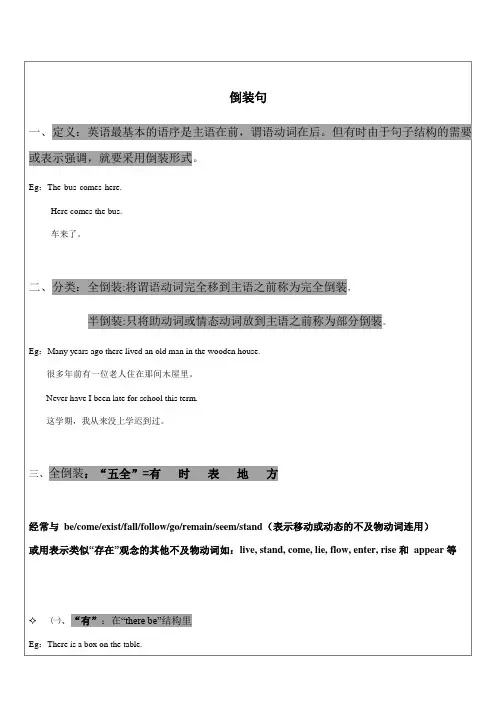
桌子上面有一个盒子。
✧㈡、“时”:表示时间副词,如:now,then,
Eg:Now comes your turn.
现在轮到你了。
✧㈢、“表”:表语放句子前,“表语+系动词+主语” 的结构
Eg:Present at the party were Mr. Green and many other guests.
格林先生和其他的客人在这个聚会上。
Seated on the ground are a group of young men.
一群年轻人坐在了地上。
✧㈣、“地”:地点状语放在句首
Eg:In south of the river lies a small factory.
小工厂位于河的南方。
From the valley came a cry.
山谷传来一阵哭声。
✧㈤、“方”:表方位的副词here, there 或out, in, up, down, away, off 等标志词放在句首 Eg:There lies a large wheat field in front of the house.
房子前面有一大片麦田。
Off all the lights went when I came in.
当我进来时,所有的灯都灭了。
四、半倒装:“八部”=不只让步也常需(虚)如此祝福✧㈠、“不”表示否定。
高中英语语法倒装句讲解及练习(附答案)
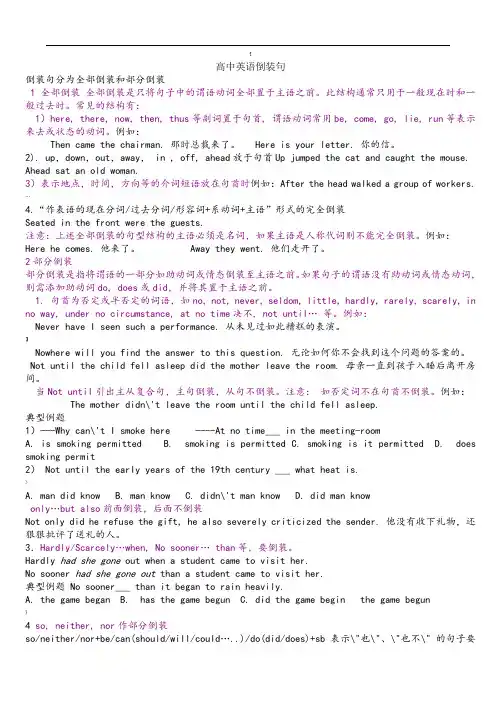
{高中英语倒装句倒装句分为全部倒装和部分倒装1全部倒装全部倒装是只将句子中的谓语动词全部置于主语之前。
此结构通常只用于一般现在时和一般过去时。
常见的结构有:1)here, there, now, then, thus等副词置于句首, 谓语动词常用be, come, go, lie, run等表示来去或状态的动词。
例如:Then came the chairman. 那时总裁来了。
Here is your letter. 你的信。
2). up,down,out,away, in , off, ahead放于句首Up jumped the cat and caught the mouse. Ahead sat an old woman.3)表示地点,时间,方向等的介词短语放在句首时例如:After the head walked a group of workers.…4.“作表语的现在分词/过去分词/形容词+系动词+主语”形式的完全倒装Seated in the front were the guests.注意:上述全部倒装的句型结构的主语必须是名词,如果主语是人称代词则不能完全倒装。
例如:Here he comes. 他来了。
Away they went. 他们走开了。
2部分倒装部分倒装是指将谓语的一部分如助动词或情态倒装至主语之前。
如果句子的谓语没有助动词或情态动词,则需添加助动词do, does或did,并将其置于主语之前。
1. 句首为否定或半否定的词语,如no, not, never, seldom, little, hardly, rarely, scarely, in no way, under no circumstance, at no time决不, not until… 等。
例如:Never have I seen such a performance. 从未见过如此糟糕的表演。
高中英语倒装句讲解(附答案)
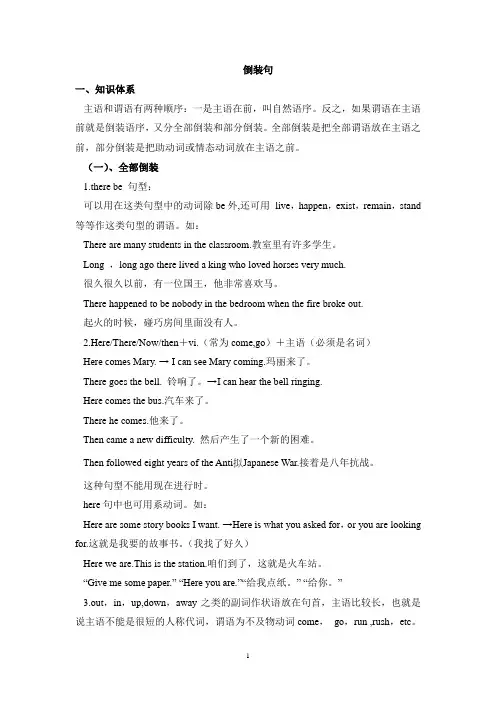
倒装句一、知识体系主语和谓语有两种顺序:一是主语在前,叫自然语序。
反之,如果谓语在主语前就是倒装语序,又分全部倒装和部分倒装。
全部倒装是把全部谓语放在主语之前,部分倒装是把助动词或情态动词放在主语之前。
(一)、全部倒装1.there be 句型:可以用在这类句型中的动词除be外,还可用live,happen,exist,remain,stand 等等作这类句型的谓语。
如:There are many students in the classroom.教室里有许多学生。
Long ,long ago there lived a king who loved horses very much.很久很久以前,有一位国王,他非常喜欢马。
There happened to be nobody in the bedroom when the fire broke out.起火的时候,碰巧房间里面没有人。
2.Here/There/Now/then+vi.(常为come,go)+主语(必须是名词)Here comes Mary. → I can see Mary coming.玛丽来了。
There goes the bell. 铃响了。
→I can hear the bell ringing.Here comes the bus.汽车来了。
There he comes.他来了。
Then came a new difficulty. 然后产生了一个新的困难。
Then followed eight years of the Anti Japanese War.接着是八年抗战。
这种句型不能用现在进行时。
here句中也可用系动词。
如:Here are some story books I wa nt. →Here is what you asked for,or you are looking for.这就是我要的故事书。
高中英语倒装句讲解 很详细的
高中英语倒装句讲解倒装句分为全部倒装和部分倒装1 全部倒装全部倒装是只将句子中的谓语动词全部置于主语之前。
此结构通常只用于一般现在时和一般过去时。
常见的结构有:1)here, there, now, then, thus等副词置于句首, 谓语动词常用be, come, go, lie, run等表示来去或状态的动词。
例如:Then came the chairman. 那时总裁来了。
Here is your letter. 你的信。
2)表示运动方向的副词或地点状语置于句首,谓语表示运动的动词。
例如:Out rushed a missile from under the bomber. 轰炸机肚底下窜出一枚导弹。
Ahead sat an old woman. 前面坐着一个老妪。
注意:上述全部倒装的句型结构的主语必须是名词,如果主语是人称代词则不能完全倒装。
例如:Here he comes. 他来了。
Away they went. 他们走开了。
.2 部分倒装部分倒装是指将谓语的一部分如助动词或情态倒装至主语之前。
如果句子的谓语没有助动词或情态动词,则需添加助动词do, does或did,并将其置于主语之前。
1. 句首为否定或半否定的词语,如no, not, never, seldom, little, hardly, at no time决不, in no way, not until…等。
例如:Never have I seen such a performance. 从未见过如此糟糕的表演。
Nowhere will you find the answer to this question. 无论如何你不会找到这个问题的答案的。
Not until the child fell asleep did the mother leave the room. 母亲一直到孩子入睡后离开房间。
当Not until引出主从复合句,主句倒装,从句不倒装。
高中英语倒装句讲解以及习题只是分享
倒装句一、定义:英语最基本的语序是主语在前,谓语动词在后。
但有时由于句子结构的需要或表示强调,就要采用倒装形式。
Eg:The bus comes here.Here comes the bus.车来了。
二、分类:全倒装:将谓语动词完全移到主语之前称为完全倒装,半倒装:只将助动词或情态动词放到主语之前称为部分倒装。
Eg:Many years ago there lived an old man in the wooden house.很多年前有一位老人住在那间木屋里。
Never have I been late for school this term.这学期,我从来没上学迟到过。
三、全倒装:“五全”=有时表地方经常与be/come/exist/fall/follow/go/remain/seem/stand(表示移动或动态的不及物动词连用)或用表示类似“存在”观念的其他不及物动词如:live, stand, come, lie, flow, enter, rise 和appear等㈠、“有”:在“there be”结构里Eg:There is a box on the table.桌子上面有一个盒子。
✧㈡、“时”:表示时间副词,如:now,then,Eg:Now comes your turn.现在轮到你了。
✧㈢、“表”:表语放句子前,“表语+系动词+主语”的结构Eg:Present at the party were Mr. Green and many other guests.格林先生和其他的客人在这个聚会上。
Seated on the ground are a group of young men.一群年轻人坐在了地上。
✧㈣、“地”:地点状语放在句首Eg:In south of the river lies a small factory.小工厂位于河的南方。
From the valley came a cry.山谷传来一阵哭声。
(完整版)高中英语“倒装句”的12种用法
高中英语“倒装句”的12种用法倒装句:英语最基本的语序是主语在前,谓语动词在后。
但有时由于句子结构的需要或表示强调,就要采用倒装形式。
将谓语动词完全移到主语之前称为完全倒装,只将助动词或情态动词放到主语之前称为部分倒装。
强调性倒装和以so、neither、nor开头的句子是高考例题的热点。
(一)倒装句的意义1、适应一定的语法结构的需要,主要是指疑问句句型结构的需要。
Was the People's Liberation Army founded in 1927?中国解放军是在1927年组建的么?2、为了强调某一部分,而把这部分放到句首,构成倒装。
Never have I been late for school this term.这学期我上学从未迟到。
(二)倒装的使用情况1、“there be”结构在这一结构里,there是引导词,主语在be后。
There is a box on the table.桌子上有个盒子。
2、疑问句疑问句为倒装形式。
Is she singing in the classroom?她是不是正在教室里唱歌?3、here、there等副词开头的句子(部分)在here、there等副词开头的某些句子中(要用一般现在时态)(前两个例句);如果主语是人称代词,主语和主要动词的词序不变。
(完全倒装)(最后一个例句)There goes the bell.铃响了。
Here is an apple for you.这个苹果给你。
There she comes.她来了。
4、重复倒装句型在以so、nor、neither开头,表示谓语所述的情况也适用于另一个人或一事物的肯定或否定句中。
so用于肯定句,表示“也一样”、“也这样”;nor、neither用于否定句,表示“同样也不,也不这样”。
I am watching TV. So is she.我在看电视,她也是。
My parents didn't watch TV last night. Neither (Nor) did I.我父母昨晚没有看电视,我也没看。
高中倒装句详细讲解
高中倒装句详细讲解倒装句一、简介:正常语序:1、定义:在英语中,我们把主语在前谓语动词在后的句子叫陈述句,把谓语动词放在主语前面的句子叫倒装句。
2、分类:①完全倒装:如果全部谓语放在主语之前,叫完全倒装。
There isa book on the table.②部分倒装:如果只把助动词或情态动词放在主语之前就叫部分倒装。
Only in this way can we learn English well.③形式倒装(前置):只把强调的内容提至句首,主谓并不倒装。
However difficult the problem may be, we must work it out this evening.三、讲解1.完全倒装通常只用于一般现在时和一般过去时,且主语是名词①There be 句型②here, there, then+comes/goes句型(一般现在时)Now comes your turn.③up, down, in, away, off, in 放在句首,达到修辞效果A way hurried the boy.④介词短语in the room, on the wall放在句首In a lecture hall of a university in England sits a professor.⑤表语置于句首时,表语+系动词+主语(such)Such was Albert Einstein, a simple man and the 20th century's greatest scientist.Gone are the days when we enjoyed the happy time in thewood.⑥用于so,neither ,nor 开头的句子,表示重复前句的部分内容。
原句的谓语应与前句的谓语的时态、形式相一致。
(主语可以是代词)So+be/助动词/情态动词+主语“也是如此”此句型也可写成it is the same with或者so it is withHe has been to Canada. So have I.练习1. ______________ , with tears in her eyes.A. Out she rushesB. Out rushes sheC. Out does she rushD. Rush does she out2. This dress doesn't fit me.___________ does that one.A. NorB. AsC. SoD. And3. _____________ when we Chinese people must depend on others.A. The days gone are foreverB. Are the days gone foreverC. Gone forever are the daysD. Forever go the days4. On the other side of the street _______________A. the broken car wasB. was the broken carC. the car was brokenD. was the car broken5. Up _____________ into the air.A. did the arrow goB. the arrow wentC. went the arrowD. the arrow goes6. Now______________ your turn to retell the text.A. there isB. there ComesC. comesD. has comes7. I was a teaeher but I want to be a doctor now. ___________A. So is my friendB.So do my friendC. So was my friendD. So it is with my friend2.部分倒装①So, neither, nor 引导的缩略答语中So sb does/is.确实如此注意比较全部倒装中的用法②Only修饰副词、介词短语或状语从句,且放在句首时Only in this way can we learn English well.注意1.在部分倒装句中,如果谓语部分无助动词,则须找助动词。
- 1、下载文档前请自行甄别文档内容的完整性,平台不提供额外的编辑、内容补充、找答案等附加服务。
- 2、"仅部分预览"的文档,不可在线预览部分如存在完整性等问题,可反馈申请退款(可完整预览的文档不适用该条件!)。
- 3、如文档侵犯您的权益,请联系客服反馈,我们会尽快为您处理(人工客服工作时间:9:00-18:30)。
高中英语倒装句讲解倒装句分为全部倒装和部分倒装全部倒装是只将句子中的谓语动词全部置于主语之前。
此结构通常只用于一般现在时和一般过去时。
常见的结构有:1)here, there, now, then, thus等副词置于句首, 谓语动词常用be, come, go, lie, run等表示来去或状态的动词。
例如:Then came the chairman. 那时总裁来了。
Here is your letter. 你的信。
2)表示运动方向的副词或地点状语置于句首,谓语表示运动的动词。
例如:Out rushed a missile from under the bomber. 轰炸机肚底下窜出一枚导弹。
Ahead sat an old woman. 前面坐着一个老妪。
注意:上述全部倒装的句型结构的主语必须是名词,如果主语是人称代词则不能完全倒装。
例如:Here he comes. 他来了。
Away they went. 他们走开了。
14.2 倒装句之部分倒装部分倒装是指将谓语的一部分如助动词或情态倒装至主语之前。
如果句子的谓语没有助动词或情态动词,则需添加助动词do, does或did,并将其置于主语之前。
1. 句首为否定或半否定的词语,如no, not, never, seldom, little, hardly, at no time, in no way, not until…等。
例如:Never have I seen such a performance. 从未见过如此糟糕的表演。
Nowhere will you find the answer to this question. 无论如何你不会找到这个问题的答案的。
Not until the child fell asleep did the mother leave the room. 母亲一直到孩子入睡后离开房间。
当Not until引出主从复合句,主句倒装,从句不倒装。
注意:如否定词不在句首不倒装。
例如:I have never seen such a performance.The mother didn't leave the room until the child fell asleep.典型例题1)Why can\'t I smoke here?At no time___ in the meeting-roomA. is smoking permittedB.smoking is permittedC. smoking is it permittedD.does smoking permit答案A. 这是一个倒装问题。
当否定词语置于句首以表示强调时,其句中的主谓须用倒装结构。
这些否定词包括no, little, hardly, seldom, never, not only, not until等。
本题的正常语序是Smoking is permitted in the meeting-room at no time.2)Not until the early years of the 19th century ___ what heat is.A. man did knowB. man knowC. didn't man knowD. did manknow答案D.看到Not until…的句型,我们知道为一倒装句,答案在C,D 中选一个。
改写为正常语序为,Man did not know what heat is until the early years of the 19th. 现在将not提前,后面就不能再用否定了,否则意思就变了。
14.3 以否定词开头作部分倒装如Not only…but also, Hardly/Scarcely…when, No sooner…than等,要倒装。
例如:Not only did he refuse the gift, he also severely criticized the sender. 他没有收下礼物,还狠狠批评了送礼的人。
Hardly had she gone out when a student came to visit her. 她刚出门,就有个学生来访。
No sooner had she gone out than a student came to visit her. 她刚出门,就有个学生来访。
典型例题No sooner___ than it began to rain heavily.A. the game beganB.has the game begunC. did the game beginD.had the game begun答案 D. 以具有否定意义的副词放在句首时,一般采用倒装句(谓语前置)。
这类表示否定意义的词有never, seldom, scarcely, little, few, not, hardly, 以及not only…but (also), no sooner…than, hardly…when scarcely…when等等。
注意:只有当Not only…but also连接两个分句时,才在第一个分句用倒装结构。
如果置于句首的Not only…but also仅连接两个并列词语,不可用倒装结构,如Not only you but also I am fond of music。
14.4 so, neither, nor作部分倒装用这些词表示\"也\"、\"也不\" 的句子要部分倒装。
例如:Tom can speak French. So can Jack. 汤姆会讲法语,杰克也会。
If you won\'t go, neither will I.你不去,我也不去。
典型例题---Do you know Jim quarreled with his brother?---I don\'t know, _____.A. nor don\'t I careB. nor do I careC. I don\'t care neitherD. I don\'t care also答案:B. nor为增补意思\"也不关心\",因此句子应倒装。
A错在用don\'t 再次否定,C neither 用法不对且缺乏连词。
D缺乏连词。
注意:当so引出的句子用以对上文内容加以证实或肯定时,不可用倒装结构。
意为\"的确如此\"。
例如:Tom asked me to go to play football and so I did. 汤姆邀我去踢球,我去了。
---It\'s raining hard.---So it is. 雨下得真大。
是呀。
14.5 only在句首倒装的情况。
例如:Only in this way, can you learn English well. 只有这样,你才能学好英语。
Only after being asked three times did he come to the meeting. 叫了三次,他才来参加会议。
如果句子为主从复合句,则主句倒装,从句不倒装。
例如:Only when he is seriously ill does he ever stay in bed. 病得狠重时,他才卧床休息。
14.6 as, though 引导的倒装句as / though引导的让步从句必须将表语或状语提前(形容词, 副词, 分词, 实义动词提前)。
但需注意:1)句首名词不能带任何冠词。
2)句首是实义动词, 其他助动词放在主语后。
如果实义动词有宾语和状语,随实义动词一起放在主语之前。
例如:Try hard as he will, he never seems able to do the work satisfactorily. 他工作很努力,但总不能让人满意。
注意:让步状语从句中,有though,although时,后面的主句不能有but,但是though 和yet可连用。
14.7 其他部分倒装1)so…that 句型中的so 位于句首时,需倒装。
例如:So frightened was he that he did not dare to move an inch. 他害怕得很,动也不敢动。
2)在某些表示祝愿的句型中。
例如:May you all be happy. 愿你们都快乐。
3)在虚拟语气条件句中从句谓语动词有were, had, should等词,可将if 省略,把were, had, should 移到主语之前,采取部分倒装。
例如:Were I you, I would try it again. 我是你的话,就再试一次。
典型例题:1)Not until the early years of the 19th century___ what heat isA. man did knowB. man knewC. didn't man knowD. did man know答案为D.否定词Not在句首,要求用部分倒装的句子结构。
2)Not until I began to work ___ how much time I had wasted.A. didn\'t I realizeB. did I realizeC. I didn\'t realizeD. I realize答案为B。
3)Do you know Tom bought a new car?I don\'t know, ___.A. nor don\'t I careB. nor do I careC. I don\'t care neitherD. I don\'t care also答案为B. 句中的nor引出部分倒装结构,表示\"也不\"。
由so, neither, nor引导的倒装句,表示前一情况的重复出现。
其中, so用于肯定句, 而neither, nor 用在否定句中。
倒装句练习1. Look,________.A. here the bus comesB. here is the bus coningC. here comes the busD. here the bus is coming2. —Where is Kate? —Look,_______, she is at the school gate.A. there she isB. there is sheC. here you areD. here it is3. Which of the following sentences is correct?A. In the teacher cameB. In did come the teacherC. In did the teacher comeD. In came the teacher4. Out _____, with a stick in his hand.A. did he rushB. rushed heC. he rushedD. he did rush5. _______, he is honest.A. As he is poorB. Poor is heC. Poor as he isD. Poor as is he6. ________, he knows a lot of things.A. A child as he isB. Child as he isC. A child as is heD. Child as is he7. _____, you can’t lift yourself up.A. Even you’re strongB. Strong as you areC. How strong you areD. In spite you’re strong8. So carelessly ________that he almost killed himself.A. he drivesB. he droveC. does he driveD. did he drive9. Early in the day ____the news _____the enemy were gone.A. come; thatB. came; thatC. comes; thatD. came; what10. Only when you realize the importance of foreign languages_____ them well.A. you can learnB. can you learnC. you learnedD. did you learn11. Only after liberation _____ to be treated as human beings.A.did they beginB. they had begunC. they did beginD. hadthey begun12. Not only ____ to stay at home, but he was also forbidden to see his friends.A. he was forcingB. he was forcedC. was he forcingD. was he forced13. Not until his father was out of prison____ to school.A. can John goB. John can goC. could John goD. John could go14. Never before _____ seen such a stupid man.A. am IB. was IC. have ID. shall I15. Rarely ____such a silly thing.A. have I heard ofB. I have heard ofC. am I heard ofD. hadI heard of16. Little _____ about his own health though he was very ill.A. he caredB. did he careC. does he careD. he cares17. Only when _____ in the afternoon _____ able to leave.A. the match was over; they wereB. was the match over; were theyC. was the match over; they wereD. the match was over; were they18. Hardly ____ down ____ he stepped in.A. had I sat; thanB. I had sat; whenC. had I sat; thenD. hadI sat; when19. No sooner _____asleep than she heard a knock at the door.A. she had fallenB. had she fallenC. she had fellD. had she fell20. She did not see Smith. ________.A. Neither did IB. Nor didn’t IC. Neither I didD. So didn’t I21. In front of the farmhouse ______.A. lay a peasant boyB. laid a peasant boyC. a peasant layD. did a peasant boy lie22. —You ought to have given them some advice. —_____, but who cared what I said ?A. So ought youB. So I oughtC. So did youD. So I did23. —It was hot yesterday. —_____.A. It was so.B. So was it.C. So it was.D. So it did24. No longer _____ to be monitor of the class.A. is he fitB. he is fitC. he fitD. fit be25. —You like football very much. —________.A. So do IB. So I doC. I do tooD. It is the same with me26. Only by practicing a few hours every day___ be able to master the language.A. you canB. can youC. you willD. will you27. Hardly _____ the bus stop ___ the bus arrived.A. we had got to; whenB. we had got to; thenC. had we got to; thanD. had we got to; when28. —Where is your brother? —There ______.A. he is comingB. he comesC. comes heD. does he come29. _____ earlier you would have met him.A. If you cameB. If you did comeC. Did you comeD. Had you come30. Not only ____ polluted but ____crowded.A. was the city; were the streetB. the city was; were the streetC. was the city; the streets wereD. the city was; the streets were31. She is a teacher and works at the college. _______.A. So is Li MingB. So does Li MingC. So is it with Li MingD. So it is with Li Ming32. Now ___ Tom’s turn to recite the text.A. there isB. is goingC. has comeD. comes33.Hearing the cat coming, off_____.A. fled all the miceB. away fled the miceC. all the mice fled awayD. fleeing all the mice34. _______ reading and speaking English every day, he would speak it well enough now.A. Had he practicedB. Did he practiceC. Should he practiceD. Were he to practice35. Nearby _____ in which they had spent their summer vacation.A. was two housesB. two houses wereC. were two housesD. are two houses36. Not only a writer but also ______ here.A. an actor was wantedB. was an actor wantedC. an actor were wantedD. were an actor wanted37. So tired ____ after a whole day’s heavy work that I ____ stand on my feet.A. was I; could hardlyB. was I felt; could hardlyC. was I; couldn’t hardlyD. I was; hardly couldn’t38. Only in this way_____expect to get over so many difficulties.A. we are sure toB. can weC. that we canD. that can we39. After that we never saw her again, nor ________ from her.A. did we hearB. we heardC. has we heardD. we have heard40. Not until I began to work _____ how much time I had wasted.A. didn’t I realizeB. did I realizeC. I didn’t realizeD. I realize41. —Do you know Jim quarreled with his brother? —I don’t know, _____.A. nor don’t I careB. nor do I careC. I don’t care neitherD. I don’t care also42. You can’t imagine ______ whe n they received these nice Christmas presents.A. how they were excitedB. how excited they wereC. how excited were theyD. they were how excited43. Not until all the fish died in the river _____ how serious the pollution was.A. did the villagers realizeB. the villagers realizedC. the villagers did realizedD. didn’t the villagers realize44. Little _____ about his own safety, though he was in great danger himself.A. does he careB. did he careC. he caresD. he cared45. —David has made great progress recently. —_______, and _______.A. So he has; so you haveB. So he has; so have youC. So has he; so haveD. So has he; so you have46. —It was careless of you to have left your clothes outside all night.—My God! ______.A. So did IB. So I didC. So were youD. So did you47. Not a single song ________ at yesterday’s party.A. she sangB. sang sheC. did she singD. she did sing48. _____ the people have become masters of their own country that science can really serve the people.A. Only thenB. It is only thenC. Only whenD. It is only when49. Not only _______ difficult to understand, but it was too long.A. it wasB. it madeC. did it makeD. was it50. Only when the rain stopped _____ again.A. the match startedB. does the match startC. did the match startD. the match had started51. ______ had I finished my translation when the class was over.A. NeverB. No soonerC. HardlyD. How52. In _______ and the lesson began.A. he cameB. came heC. he comesD. comes he53. On the wall ______ two large pictures.A. hangsB. hangC. hangedD. are hanging54. Such ______ the results of the experiments.A. isB. wasC. areD. as be55. —They have done a good job. —________.A. So they have doneB. So they haveC. So have theyD. So is it56. ______ he realized it was too late to return home.A. No sooner it grew dark thanB. Hardly did it grow dark whenC. It was not until dark thatD. It was until dark that57. _____, Mother will wait for him to have dinner together.A. However late is heB. However he is lateC. However is he lateD. However late he is58. _____ hot is the sun that we cannot go out at present.A. VeryB. TooC. SoD. Such1-10 CADCC BBDBB 11-20 ADCCA BDDBA21-30 ADCAB DDBDC 31-40 DDAAC AABAB41-50 BBABB BCDDC 51-58 CABCB CDC。
